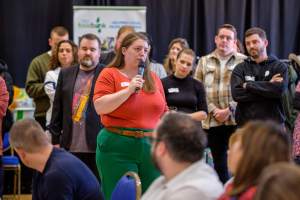 Comms Camp is an unusual conference.
Comms Camp is an unusual conference.
For starters, there’s no agenda and no speakers. Yet over a hundred comms people (many local government and NHS) vie for tickets, travel sometimes long distances (even across the pond) and spend the day together talking all things communication.
Why?
It could be because of the mountains of cake available to eat all day, but I suspect it has more to do with the great discussions that come out of the day. The kinds of discussions you can only have when the participants choose the topics to discuss.
After hearing all about CommsCamp for a number of years it was great to finally get to attend and experience it for myself, this year taking place in Bradford. As sponsors of CommsCamp North, I traveled up with a suitcase full of useful resources (which we’ve made available online) and used the journey to program the NFC stickers that were going on to our handouts.
As soon as Comms Camp starts, everything moves fast. Introductions happened at top speed, followed by pitches as anyone who wanted to run a session lined up ready for their thirty seconds to speak. I joined the line and inched closer and closer to the front until finally a microphone was thrust into my hand and I was pitching a crisis comms discussion to that 100+ audience.
Behind me, volunteers furiously wrote the pitches onto post-it notes and slapped them up onto the wall where an empty agenda was stuck up. Soon the agenda was filled with bright coloured post-its and the day was set. There was barely time to take it in before we were all off to the first session of the day.
I joined a discussion on storytelling that was so popular they ran out of chairs quickly and soon people were lining the walls and sat cross-legged on the floor in the middle of the circle. The discussion zigzagged across the room, from someone wanting to know how to go beyond telling stories using dry case studies to a longer discussion on the moral and ethical issues surrounding telling stories of vulnerable people. Creative ideas and advice were shared on how to build trust and listen well.
Time flew and before we all knew it it was time for the next session with just enough time to stop by the cake stand and have a chat with a few people who stopped by the Social Simulator display.
For session number two, it was time for the crisis comms. There had been two crisis comms pitches so we joined forces. Alongside a wider conversation on communicating larger long-term crises such as climate change, we had a valuable and much-needed discussion about protecting your mental health, especially when you’re handling comms for a sensitive or distressing subject.
Lunch was a chance to scoff more cake (I had three pieces of Mars Bar Krispie cake) and have a few more chats with people who stopped by our display to pick up a sticker, a scenario planning grid, or test out their preparedness with our ‘Are you crisis-ready quiz’
For the third session of the day, I stepped back into the main room where a discussion had already started. The topic: how to stop colleagues from requesting a video for every single project they are working on. A tricky subject, especially when most social channels promote videos so heavily and it’s hard to say no sometimes!
I stayed in the same room for the fourth session of the day as a large group gathered to talk about TikTok. Some attendees were already dipping their toes into the video platform and others were looking for advice on where to start.
Whilst attending on behalf of a digital agency meant that I wasn’t experiencing the same issues and frustrations as many of the other attendees, I’ll still be going away with those frustrations at the top of my mind as we look for ways we can help our clients deal with the pressures they are facing, both internal and external.
I’m glad to know so many people got so much out of the day, even if they turned up not knowing what that would be. To everyone who took home some of our resources, I hope they are helpful! If you didn’t get a chance - all the resources are on our website.